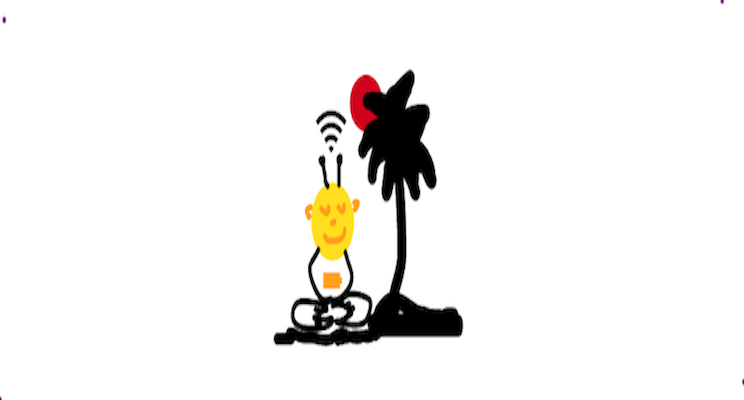Make Time Fungible to Find Peace at Work
It all started a decade ago on a family trip from the US to India. En route, I had a two-day halt at a relative’s house in Abu Dhabi. It was a weekend and I woke up to a lazy Sunday morning. We still had to make the trip to India later in the day. To my surprise, I found everyone in the house busy and getting ready for a day at work. I was unaware until then that the weekend in the Emirates is on Friday and Saturday. So, everyone is back to their busy lives on a Sunday! On the way to the airport, cars were already lined up on the freeway and we were lucky to make an early start to avoid the peak traffic! This trivial experience opened my eyes to how time is programmed into our perception of the world right from our school days — There is a weekday and as a consequence, there is a weekend! Weekdays are meant for working, Weekends are meant to have fun and relax! Saturday and Sunday are the days when we unwind and prepare for the long week ahead!
Something about a Sunday not being a holiday in certain parts of the world stuck with me. It made me no longer yearn for weekends! I was not desperate to wait for that Friday evening excitement or frown over the Sunday evening boredom anymore. While it took a couple of years since then to genuinely figure how to tame the mind to look at time differently, I developed a more relaxed approach towards all the craziness around us. Had to do a home project? No problem, I didn’t keep it for the ‘weekend’ only. Had to send an important document to the team? No problem, I sat down to write it on a Saturday afternoon and sent it out. This gave me a greater pool of “minutes” to utilize over a broader time horizon for the work I had to do, personal or professional. While the horizon is still not limitless and remains finite as before, it does however give the sense that it is infinite! Perception matters a lot here as taming the mind or calming it is the first step towards a peaceful life.
One of the fundamental challenges to looking at time differently is that the workplace has been designed to timebox us into productivity machines that follow the clock. Most people around the world are locked in this box for much of their productive day when the Sun is still out. It is either an eight-hour or a twelve to even sixteen-hour work schedule. Note the word “schedule” that is generously used by us when talking about our work! The modern workplace (pre-covid times) was an adaptation of the factory model from the industrial age. We have workers, who work according to a schedule; we have managers, to boss over them and tell them what to do; and then we have chiefs, who figure what work needs to be produced, when and how! Even with the advent of the age of Knowledge, the internet revolution, we have had been sticking to the same rules of a Monday-Friday regimen, with some of them even ambitiously going beyond it to show that Saturday need not be spared.
I mentioned pre-covid times in the earlier paragraph, as the rising (or maybe eventually waning?) trend of WFH is one of the soft revolutionary trends that the knowledge economy should have long adopted. Luckily, some of the bigger technology firms (e.g. Google, Facebook) are figuring out how to go about allowing it permanently into the future. The biggest hurdle to this trend would however be the well conditioned bosses and chiefs in the factory-system hierarchy, who will find the WFH option as counter-intuitive or even as grossly over-celebrated. However, what WFH gives is the ability for us to rethink the time and space constraints for work. What work can be done without the need for an office space? How can work be done without the need for physical interaction? When can work be done without the imaginary 9–5 schedule? Not all work fits into the WFH paradigm and that is exactly the reason why we should also have WFH as a self-elected and constraint-free option available to employees. An omnichannel model for human work! The office space is not going to disappear, but its utilization and utility can be re-imagined. This will also free up humans from the fear of time — clocking in their time at work and building the perception of being active, under the fear that someone is watching them from above or being deluded by the idea that work completion follows a linear time pattern!
As some or many of you may have realized in these forced marathon WFH sessions during the covid pandemic, we don’t work for eight hours straight. We don’t work until it is lunch time and then go back to work and keep going at it till the clock ticks in the evening signaling to leave for home. Given our way with no constraints in place, we allocate and utilize chunks of time based on the outcomes and goals we want to achieve either for that day or during the course of a few days (we should not get trapped in the concept of “day” or “week” either). Sometimes, we work straight for a couple of hours, which by the way is barely possible nowadays in the scoot-to-a-meeting routine at offices. Other times, we work in 10, 15 or 25 minute (akin to a Pomodoro technique) chunks of intense work followed by relaxation. Some days will be packed while other days need not be so and one does not need to see the same faces every day. No matter how fancy the modern workplace is made to be to provide options for relaxation, I don’t think there is a stronger case to be made for the family couch or a little petting time with your dog or cat.
I want to make a case for something in addition to WFH to build a peacefully productive and successful life. When you understand time as only a tool available among several others in your arsenal, you will start losing your Sunday evening anxiety, the Monday morning boredom, the Wednesday evening agitation, the Friday evening excitement and the unwanted Saturday evening desperation for happiness. This in itself will bring peace. Beyond that is where I recommend adopting what I wish to call as the “Farmer’s Regimen”. It looks something like this compared to the typical way of working as part of a factory regiment:
Here is a sample conversation of a manager checking in on a similar piece of work done by an employee with a a farmer’s regimen (left) vs. one without (right):
And it finally ends like this…A few days later:
Chunk Your Time
This may be a little difficult to imagine for someone detached from a farming background. I myself, have only used the concept loosely, and don’t intend to imply that farmers work only in this manner. A farmer (not the faux factory-farmer kind) typically works in chunks of activity, both during a day and throughout the year. The output could be successful production, harvesting and sale of a particular crop variety. While a farmer is focused on output, he is aligned to a very clear outcome, feed the customer with the right product. He goes about adapting to the whims of nature (business climate!) on a continuous basis (a day’s or week’s worth of activity means nothing) in order to achieve that outcome.
One day, he may rise early to prepare the land that he may then continue doing so across hours that can span into half-days, days, weeks and so on. An other day, he may stay up late to protect the harvest from pests and on other days, he may just not visit the farm but sit at home or under a tree while letting the action happen. Interestingly enough, a farmer is also the biggest risk taker and prone to sudden changes in fortune (for example, a longer-term drought or a shorter-term flood) that could make or break all the hard work done in the past. Irrespective of such failures, the farmer leads a very simple and balanced life so that the setbacks and windfalls of today don’t affect how he reacts to what is in store for him tomorrow! More importantly, the farmer keeps time fungible even though he tracks them as seasons to produce and sell varieties of crops. Gantt charts, project timesheets, milestone trackers and other needle-prickers are not useful to him. There are some cons to this approach but my case is not for one to become a farmer, but just borrow some time-tested wisdom from our ancient peasant elders (check writings by Nassim Taleb to understand why grandma knows best!).
Contrast that with a factory-style worker who doesn’t own or have any stake or heart in the production of output (even for the cool software engineer sitting for hours in front of a computer in an air-conditioned building). The outcomes are largely generalized and hence, defined outputs dominate the schedule either in a day or throughout the year. Everything is timed, gamed into a system, which is then ‘modeled’ and ‘frameworked’ into dictums. If nothing is timed, you are tempted to time it yourself as that itch is irresistible and has to be scratched. In due course of time, you end up demonizing the workweek and fantasizing the weekend — both being nothing but illusions of a tired mind and body.
So, if you want to have a peacefully productive life, go ask your boss to formalize a self-selected WFH option, push for outcomes rather than just outputs in your work, stop asking for promotions as you don’t want to become a factory-style boss and more importantly — look at time from the lens of the farmer’s regimen.

